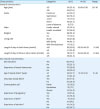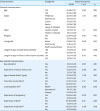Abstract
Purpose
To determine associations of traumatic events and post-traumatic stress disorder (PTSD) with sexual autonomy and identify factors influencing sexual autonomy among female university students of North Korean defectors.
Methods
A cross-sectional, descriptive study was performed with a total of 103 female students who completed a structured online self-report survey from January 7 to March 31, 2018. This study was conducted using questionnaires on interpersonal trauma scale, the Traumatic Scale for North Korean Refugees (TSNKR), and sexual autonomy measurement for college students. Data were analyzed using descriptive statistics, t-test, one-way ANOVA, Pearson's correlation coefficients, and multiple linear regression with SPSS WIN 23.0 program.
Results
Traumatic events, PTSD, and sexual autonomy scores were 3.96±3.07, 31.47±10.75, and 52.66±6.89, respectively. PTSD was positively correlated with traumatic events (r=.22, p=.030). Sexual autonomy was inversely correlated with PTSD (r=−.25, p=.010). Contraceptive use, PTSD, and voluntary sexual debut explained 26% of sexual autonomy of participants.
Figures and Tables
Table 1
General and Sex-related Characteristics of Subjects (N=103)

Table 2
The Degree of Traumatic Events, PTSD and Sexual Autonomy (N=103)

Table 3
Differences in Sexual Autonomy by General and Sex-related Characteristics (N=103)

Table 4
Correlations of Traumatic Events, PTSD and Sexual Autonomy (N=103)

| Variables | Traumatic events | PTSD |
|---|---|---|
| r (p) | r (p) | |
| PTSD | .22 (.030) | - |
| Sexual autonomy | −.02 (.855) | −.25 (.010) |
Summary Statement
-
• What is already known about this topic?
Most female North Korean defectors are known to have post-traumatic stress disorder (PTSD) which is positively correlated with traumatic experience. Previous studies have shown that women with PTSD have negative sex-related behaviors. -
• What this paper adds?
This is the first study to investigate sexual autonomy and PTSD among young female North Korean defectors. Results showed that the greater the severity of PTSD, the lower the sexual autonomy. In addition, this study revealed that PTSD was an influential factor of sexual autonomy. Our findings confirmed that the use of contraception, PTSD, and voluntary sexual debut were influential factors of sexual autonomy. -
• Implications for practice, education, and/or policy
When providing reproductive health education for female North Korean defectors, it is necessary to develop educational programs that include discussion of contraception, sexual assertiveness training, and psychological intervention therapies.
References
1. Ministry of Unification. 2018 North Korean defectors policy [Internet]. Seoul: Ministry of Unification;2018. cited 2018 Sep 1. Available from: https://www.unikorea.go.kr/unikorea/business/statistics/.
2. Lee SK. A study on the identity composition of North Korean 1.5th generation migrant women [master's thesis]. Seoul: Ewha Womans University;2009. 117.
3. Kim SH, Hyun IA, Cho YJ. A study on the improvement of North Korean defectors' adaptability to university life in the Republic of Korea. Seoul: Korea Hana Foundation;2016. p. 192.
4. Han IY, Ku HJ, Oh SK. A study on sex knowledge among North Korean female. Korean Journal of Woman Psychology. 2010; 15(1):87–102.
5. Chang SB, Lee MK. Sexual autonomy in college students. Journal of Korean Academy of Nursing. 2003; 33(3):339–346.


6. Chang SB. Development of sexual autonomy measurement for college students. Korean Journal of Women Health Nursing. 2002; 8(1):106–115.

7. Cho GY, Kim YH. Factors affecting sexual autonomy among female university students. Journal of the Korea Academia-Industrial Cooperation Society. 2014; 15(11):6710–6718.

8. Do ES, Seo YS. Factors influencing sexual autonomy in college students. Journal of Korean Academy of Fundamentals of Nursing. 2013; 20(2):129–136.

9. Park S, Song W. The effects of rape myth and tolerance towards violence on dating to the sexual assertiveness in college women. Korean Journal of Woman Psychology. 2012; 17(2):265–280.
10. Jouriles EN, Choi HJ, Rancher C, Temple JR. Teen dating violence victimization, trauma symptoms, and revictimization in early adulthood. Journal of Adolescent Health. 2017; 61(1):115–119.

11. Kolts RL, Robinson AM, Tracy JJ. The relationship of sociotropy and autonomy to posttraumatic cognitions and PTSD symptomatology in trauma survivors. Journal of Clinical Psychology. 2004; 60(1):53–63.


12. Goldstein B, Bradley B, Ressler KJ, Powers A. Associations between posttraumatic stress disorder, emotion dysregulation, and alcohol dependence symptoms among inner city females. Journal of Clinical Psychology. 2017; 73(3):319–330.


13. Overstreet NM, Willie TC, Hellmuth JC, Sullivan TP. Psychological intimate partner violence and sexual risk behavior: examining the role of distinct posttraumatic stress disorder symptoms in the partner violence-sexual risk link. Women's Health Issues. 2015; 25(1):73–78.


14. Son YH, Lee JS, Park MC, Lee SY. Influence of posttraumatic stress on the mental health among adolescents of North Korean refugees. Anxiety and Mood. 2010; 6(1):37–44.
15. Kim MJ. A study on North Korean female defectors' traumatic experience. Korean Journal of Clinical Social Work. 2010; 7(1):1–18.
16. Jeon W, Hong C, Lee C, Kim DK, Han M, Min S. Correlation between traumatic events and posttraumatic stress disorder among North Korean defectors in South Korea. Journal of Traumatic Stress. 2005; 18(2):147–154.


17. Yoon YS, Kim HA, Han SY. Validation and development of a post-traumatic stress symptom scale for dislocated North Koreans in South Korea. The Korean Journal of Counseling and Psychotherapy. 2007; 19(3):693–718.
18. Faul F, Erdfelder E, Buchner A, Lang AG. Statistical power analyses using G*Power 3.1: tests for correlation and regression analyses. Behavior Research Methods. 2009; 41(4):1149–1160.


19. Won JH. A study of relations between complex PTSD, experiential avoidance and repetitive interpersonal trauma, among North Korean refugees [master's thesis]. Seoul: Kwangwoon University;2014. 72.
20. Kang S. Development of Trauma Scale for North Korean refugee [master's thesis]. Seoul: Yonsei University;2001. 82.
21. Kim MO, Ha JY. A study on sexual autonomy, attitude towards homosexuality, and reproductive health promoting behavior among undergraduate students. Asia-Pacific Journal of Multimedia Services Convergent with Art, Humanities, and Sociology. 2018; 8(3):723–732.
22. Yee NH, Jung JS, Song HS. Influencing factors on female university students' sexual experience and sexual assertiveness. Journal of the Korea Academia-Industrial Cooperation Society. 2016; 17(3):414–422.

23. Kim HA. Meta-analytic review on the mental health among the North Korean refugees in South Korea (depression and post-traumatic stress disorder). Crisisonomy. 2016; 12(1):105–124.
24. Lowry R, Robin L, Kann L. Effect of forced sexual intercourse on associations between early sexual debut and other health risk behaviors among US high school students. Journal of School Health. 2017; 87(6):435–447.

25. Wiles M, Agustin S, Narasimhan S, Gipson JD. Reproductive consequences of unwanted sexual debut among young adult women from Metro Cebu, Philippines. Health Care for Women International. 2018; 39(8):888–905.

26. Lee RLT, Yuen Loke A, Hung TTM, Sobel H. A systematic review on identifying risk factors associated with early sexual debut and coerced sex among adolescents and young people in communities. Journal of Clinical Nursing. 2018; 27(3-4):478–501.


27. Park HS. A study on the effects of North Korean women defectors' gender equality consciousness: focused on gender sensitivity, sexual harassment and sexual violence recognition. Asia-Pacific Journal of Multimedia Services Convergent with Art, Humanities, and Sociology. 2018; 8(2):647–655.
28. Kim YH, Son HM. Affecting factors on reproductive health behavior of female college students. Journal of the Korean Data Analysis Society. 2010; 12(4):1935–1950.




 PDF
PDF ePub
ePub Citation
Citation Print
Print




 XML Download
XML Download